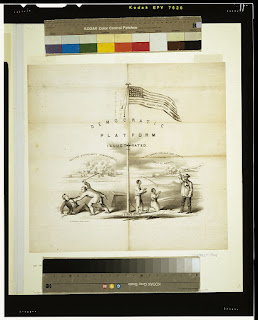George William Van Cleve's
A Slaveholders' Union can be maddening. By way of example, Van Cleve argues that the
Northwest Ordinance of 1787, passed by the
Congress of the Confederation on July 13, 1787, was part of “a political bargain reached at the [Constitutional] Convention [concerning slavery and other matters], but
outside the formal Constitution submitted for ratification.” In support of this assertion, Van Cleve states:
A useful starting point for understanding this bargain is that in the middle of the Philadelphia Convention, on July 13, 1787, the Continental Congress, acting in New York with a quorum composed in significant part of Constitutional Convention delegates who had traveled for several days from Philadelphia for the specific purpose of providing that quorum, adopted the Northwest Ordinance of 1787.
Who these members were, how many of them there were, and whether their presence was critical to achieving a quorum at the Continental Congress on July 13, 1787 – none of these things does Van Cleve bother to divulge, so far as I can tell, nor are there references to sources for these assertions.
Intrigued by Van Cleve's point but frustrated by the utter lack of supporting authority, I went to the computer to try to figure out who voted for the Ordinance and which of them were also delegates to the Constitutional Convention.
What I found was that the Ordinance passed by a vote of eight states to none. Of the individual state representatives voting on the Ordinance on behalf of their states, only one – Abraham Yates of New York – voted against:
MA – Yes (2-0)
Samuel Holten – Aye. Not a delegate to the Constitutional Convention.
Nathan Dane – Aye. Not a delegate to the Constitutional Convention.
NY – Yes (2-1)
John Haring – Aye. Not a delegate to the Constitutional Convention.
Abraham Yates, Jr. – Nay. Not a delegate to the Constitutional Convention (although his nephew Robert Yates was).
NJ – Yes (2-0)
Abraham Clark – Aye. Not a delegate to the Constitutional Convention.
DE – Yes (2-0)
Dyre Kearney – Aye. Not a delegate to the Constitutional Convention.
VA – Yes (3-0)
NC – Yes (2-0)
Benjamin Hawkins – Aye. Not a delegate to the Constitutional Convention. (Van Cleve identifies Hawkins as "Congressman (and Philadelphia Convention delegate)". This is incorrect.)
SC – Yes (2-0)
John Kean – Aye. Not a delegate to the Constitutional Convention.
Daniel Huger – Aye. Not a delegate to the Constitutional Convention.
GA – Yes (2-0)
William Few – Aye. Attended Constitutional Convention and signed.
William Pierce – Aye. Attended Constitutional Convention but did not sign.
Article V of the Articles of Confederation included a stipulation that provided that “[n]o State shall be represented in Congress by less than two, nor more than seven members.” It therefore appears that the votes of two states – both in favor of the Ordinance – were made possible because delegates from the Constitutional Convention traveled to New York. Both of Georgia's delegates to Congress were also delegates to the Convention. And one of North Carolina's delegates (without whom North Carolina would apparently not have been entitled to vote) falls into the same category.
If I understand the Articles of Confederation properly, Article IX required the votes of nine states to enact legislation concerning certain matters; legislation concerning all other matters required "the votes of the majority of the united States in congress assembled", which I believe meant an absolute majority of all states (i.e., seven out of thirteen) rather than a majority of those present.
The Confederation Congress apparently understood that the Northwest Ordinance did not fall under the supermajority rule, since the Ordinance passed with only eight votes. Assuming that a majority of all the states was required, then the addition of the votes of George and North Carolina was necessary to passage of the Ordinance, and the presence of three delegates - Blount of North Carolina and Few and Pierce of Georgia - was in fact crucial. But did they in fact travel to New York specifically to vote on the Ordinance?
To shed some light (albeit indirect light) on this issue, I used
this attendance module to determine how long the three crucial delegates were absent from the Constitutional Convention:
Blount - Absent 7/3/87 through 8/8/87
Few - Absent 7/2/87 through 8/8/87
Pierce - Absent 7/2/87 through 8/7/87
This evidence is fairly equivocal, it seems to me. On the one hand, they all seem to have left and returned at about the same time. On the other hand, they were all away for over a month; whatever they did, they clearly did not simply ride to New York, vote, and ride back. In fact, at least one of the three - William Pierce - apparently had other things on his mind. According to the
New Georgia Encyclopedia:
Although [Pierce] agreed with the end result of the proceedings [at the Constitutional Convention], Pierce did not sign the U.S. Constitution, having left the convention at the end of June to attend to "a piece of business so necessary that it became unavoidable." The business was a duel with merchant John Auldjo, after tempers flared over mishandled "mercantile dealings." Auldjo's second, Alexander Hamilton, intervened and prevented the contest.
In the end, I'm left about where I began. Van Cleve's theory is interesting, but the broad-brush assertions unbacked by detail make for frustrating reading.























